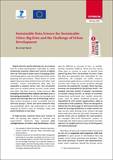|
In an analysis published in March 2013, my conclusion was: “in terms of politics of urban development, it is an open question whether Rio becomes a city of negative or positive exception. However, I am convinced that the Olympic Games in 2016 will be increasingly contested, socially and politically. In that sense, Rio might establish itself as a city of exception in the history of mega sports-events” (Braathen, 2013). More than a year later, and with the 2014 FIFA World Cup behind us, what is the status of these three different scenarios?
The contestation scenario was overwhelmingly supported by a truly alternative and spontaneous ‘mega-event’ in June 2013: the largest street demonstrations in the history of Brazil and Rio. Ten million people were out on the streets in 450 cities during the FIFA Confederations Cup (the ‘trial’ world cup), in protests against lavish and corrupt spending on mega sports events to the detriment of spending on public education, health, transport and housing (Maricato et al., 2013). However, it is still unclear which of the two other scenarios will prevail.
Download the full opinion piece [pdf]
Chance2Sustain Opinion Series - ISSN 2308-0965 |
Recent Chance2Sustain Publications |
|
|
|
|
|

